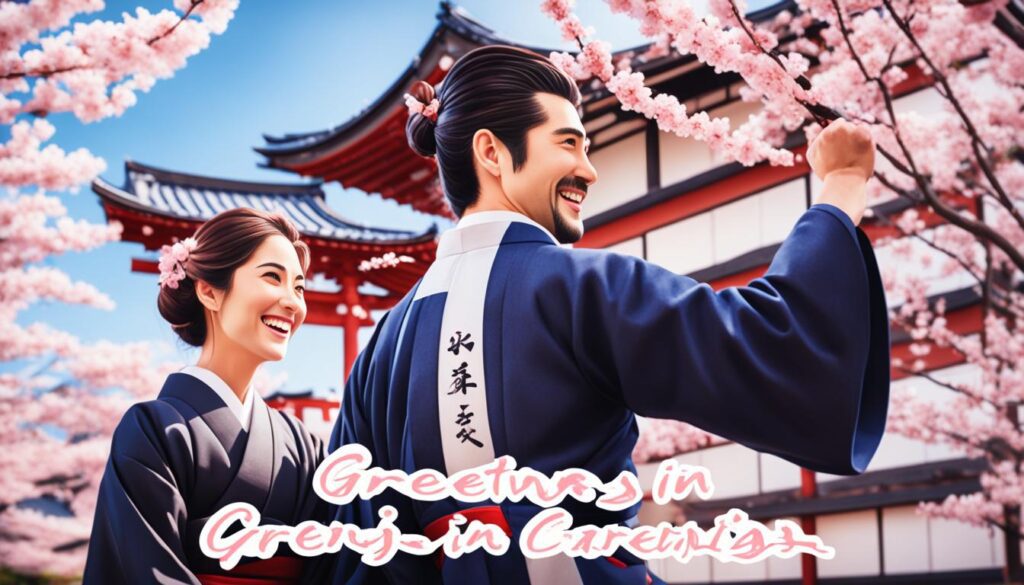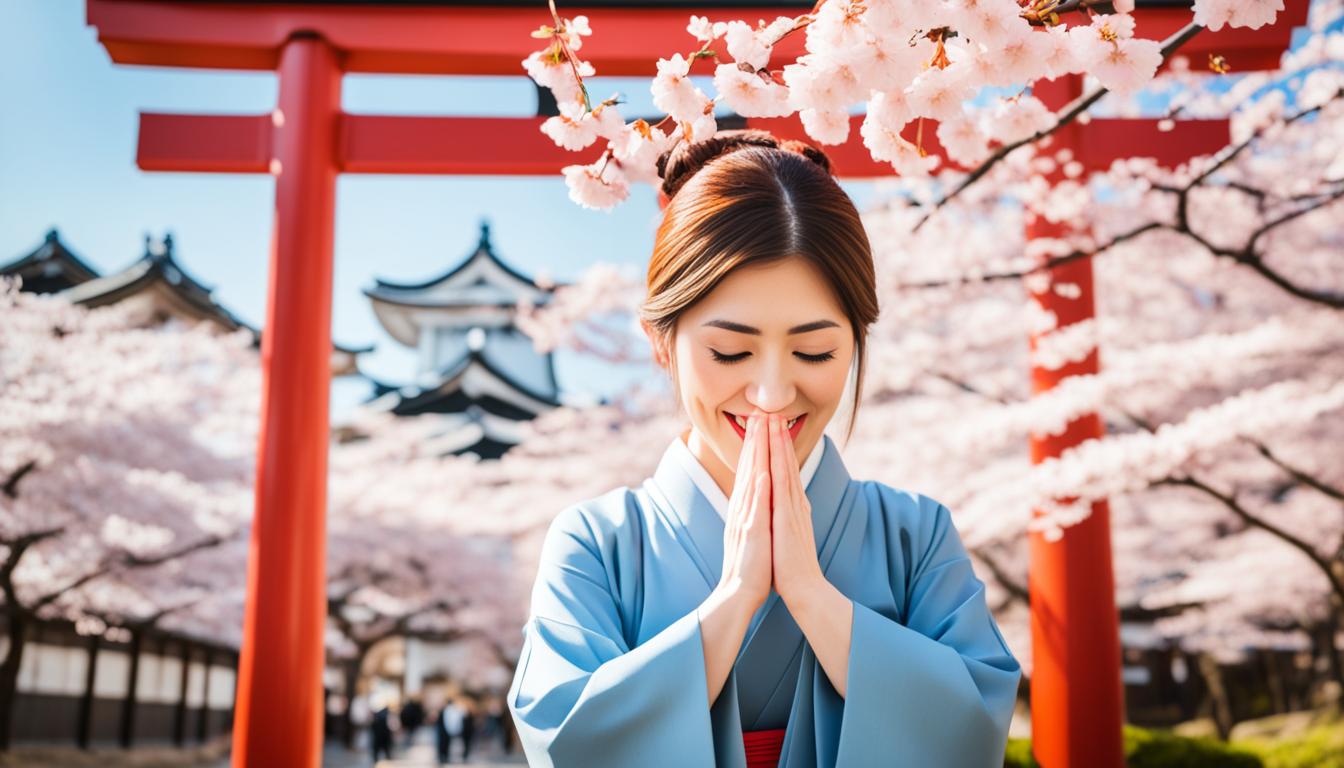Are you interested in learning how to say “hello” and ask “how are you” in Japanese? Whether you’re planning a trip to Japan, engaging in cultural exchange, or simply curious about the Japanese language, this quick guide will help you master the essential greetings in Japanese.
Japanese greetings play a crucial role in social interactions and reflect the country’s rich culture. By understanding the meaning, grammar, pronunciation, and cultural usage of greetings, you can enhance your language skills and make meaningful connections with native Japanese speakers.
In this guide, we will explore various ways to say “hello, how are you” in Japanese, including formal and informal expressions. We will also delve into the contextual and cultural usage of greetings, giving you a deeper appreciation for Japanese society.
So, let’s dive into the world of Japanese greetings and embark on a fascinating journey to learn essential phrases in Nihongo!
Things to Know Before Learning “How Are You” in Japanese
Before delving into the various ways of saying “how are you” in Japanese, it is important to understand the concept of aisatsu or greetings in Japanese culture. Greetings in Japan play a significant role in establishing social relationships and displaying good manners.
In Japanese culture, vocal communication is favored over non-verbal communication. Bowing, shaking hands, and other gestures are commonly used alongside vocal greetings, adding depth and sincerity to the greeting. Understanding the cultural context of greetings in Japan is essential in order to appreciate the importance of learning the appropriate expressions for “how are you” in Japanese.
Let’s explore the significance of greetings in Japanese culture and how they contribute to effective non-verbal communication.
| Greetings in Japanese Culture | Cultural Significance |
|---|---|
| Aisatsu | Establishes social relationships and displays good manners |
| Vocal Communication | Bowing, shaking hands, and gestures accompany verbal greetings |
| Non-Verbal Communication | Gestures add depth and sincerity to greetings |
Formal “How Are You” in Japanese
In formal settings and business situations, the commonly used phrase “おげんきですか?” (O genki desu ka?) may not be the most appropriate way to ask “how are you” in Japanese. Instead, Japanese people employ various formal expressions to show politeness and respect. These expressions often utilize formal language known as “keigo,” which is characterized by its elevated tone and respectful vocabulary.
When addressing someone in a formal context, such as a business meeting or a professional setting, it is important to use these formal expressions to convey your respect and courtesy. Moreover, these formal expressions are also used when offering condolences or expressing concern for someone’s well-being in a respectful manner.
By familiarizing yourself with these formal expressions and incorporating them into your conversations, you will be able to navigate formal situations with ease and demonstrate your understanding of Japanese etiquette and culture.
Informal Expressions Related to “How Are You” in Japanese
When interacting with your Japanese friends, family, or close acquaintances, it’s important to remember that using the formal expression “おげんきですか?” (O genki desu ka?) to ask “how are you” may sound too stiff and unnatural. In these informal settings, there are more relaxed and casual expressions used to inquire about someone’s well-being. These expressions reflect the familiarity and closeness between individuals, creating a friendly and comfortable atmosphere.
Instead of using the formal expression, you can use the following informal expressions:
1. げんき? (Genki?) – How are you?
Genki is a commonly used word among friends, which translates to “How are you?” in English. Using this casual expression shows your friendliness and genuine interest in their well-being.
2. お元気? (Ogenki?) – Are you well?
Ogenki is another informal way to ask about someone’s well-being. It is a shortened form of “おげんきですか?” (O genki desu ka?). This expression is perfect for casual conversations with close friends and family members.
3. げんきそう? (Genki sou?) – You seem well!
If you notice that your friend appears to be in good spirits or looks healthy, you can use this expression to comment on their well-being. It’s a way to compliment and acknowledge their positive state.
An image illustrating informal expressions related to “How Are You” in Japanese.
Asking About Someone’s Health or Physical Condition
In addition to general inquiries about someone’s well-being, it is common in Japanese culture to ask about specific aspects of a person’s health or physical condition. When engaging in conversations about health, it’s important to use the appropriate expressions to show genuine concern and respect.
In polite settings, you can ask someone about their well-being by using phrases such as:
- Ogenki desu ka? – How are you?
- Ogenki desu ka, genki desu ka? – How are you, are you feeling well?
- Ogenki desu ka, taitei daijōbu desu ka? – How are you, are you generally okay?
These polite expressions demonstrate your sincere interest in the other person’s mental and physical condition. Response to these inquiries may include:
- Hai, genki desu. – Yes, I’m well.
- Daijōbu desu, arigatō gozaimasu. – I’m fine, thank you.
- Mōru mo genki desu, arigatō. – I’m feeling good, thank you.
In more casual settings with close acquaintances or friends, you can use less formal expressions to inquire about someone’s health, such as:
- Genki? – How’s it going?
- Daijōbu? – Are you okay?
- Ii kanji? – How are you feeling?
In these situations, the responses can be more relaxed and casual, reflecting the familiarity and comfort between individuals. Remember to tailor your expressions based on the context and relationship with the person you are speaking to.
Common Questions about Health and Well-being in Japanese Language
To further engage in meaningful conversations about health, here are some common questions you can ask:
| English | Japanese |
|---|---|
| How is your health? | Kenkō wa dō desu ka? |
| Have you been feeling well lately? | Saikin genki desu ka? |
| Any health concerns? | Byōki nado arimasu ka? |
| Are you taking care of yourself? | Jibun no koto o chūi shite imasu ka? |
These questions demonstrate your genuine interest in the other person’s health and well-being, opening the door for meaningful discussions and fostering deeper connections in Japanese culture.
How to Answer “How Are You” in Japanese
Just as there are various ways to ask “how are you” in Japanese, there are also different ways to respond to this question. Understanding the appropriate responses will allow you to effectively communicate your well-being in Japanese. Whether you are feeling good, so-so, or not good, there are specific phrases to convey your state of mind or physical condition. It is also polite to show gratitude for someone’s concern by thanking them for asking. By mastering these responses, you can engage in meaningful conversations about well-being in the Japanese language.
Other Basic Greetings in the Japanese Language
In addition to asking “how are you” in Japanese, there are other basic greetings that are commonly used in the Japanese language. These greetings vary in formality and tone, depending on the level of familiarity and the context of the interaction. Understanding these different forms of greetings is crucial for effective communication and building connections with native Japanese speakers.
Here are the various forms of greetings in the Japanese language:
Standard form
The standard form of greeting is used in formal situations or when addressing someone of higher status. This form demonstrates respect and politeness. Examples of standard form greetings include:
| Standard Form Greetings |
|---|
| おはようございます (Ohayou gozaimasu) – Good morning |
| こんにちは (Konnichiwa) – Hello |
| こんばんは (Konbanwa) – Good evening |
Informal form
The informal form of greeting is appropriate for casual conversations with friends and family. It reflects a level of familiarity and comfort. Informal greetings are commonly used in everyday interactions. Examples of informal form greetings include:
| Informal Form Greetings |
|---|
| おっす (Ossu) – Hey |
| やあ (Yaa) – Hi |
| おやすみ (Oyasumi) – Good night |
Casual form
The casual form of greeting is used in relaxed and comfortable settings. It creates an easy-going atmosphere and is commonly used between close friends. Examples of casual form greetings include:
| Casual Form Greetings |
|---|
| おっす!元気? (Ossu! Genki?) – Hey! How’s it going? |
| やあ!調子どう? (Yaa! Choushi dou?) – Hi! How are you? |
| おやすみなー! (Oyasumi naa!) – Good night! |
By learning and using these different forms of greetings, you can enhance your communication skills and establish stronger connections with native Japanese speakers.

How to Greet Others in Japanese Culture
Greetings in Japanese culture go beyond mere words. They encompass a variety of customs and practices that are deeply ingrained in society. By understanding the gifting customs, bowing etiquette, and the overall significance of greetings in Japanese culture, you can navigate social interactions with ease and show respect for the customs of the country.
In Japanese culture, it is customary to bring a small gift when visiting someone’s home or when meeting someone for the first time. These gifts, known as “omiyage,” can be simple tokens of appreciation and are often representative of your hometown or a personal connection. By adhering to this gifting custom, you can demonstrate your thoughtfulness and create a positive impression.
Bowing is another important aspect of greetings in Japanese culture. When saying hello or expressing gratitude, it is common to bow as a sign of respect. The depth and duration of the bow can vary depending on the social context, but the gesture itself is an essential part of Japanese etiquette. By mastering the art of bowing, you can show your understanding and appreciation for Japanese cultural norms.
By embracing the gifting customs, understanding the significance of bowing, and respecting other cultural norms, you can foster positive relationships and deepen your understanding of Japanese culture. These gestures of respect and consideration will not only enhance your social interactions but also showcase your genuine interest in and appreciation for the customs of the country.

